- Home
- Anson Cameron
Nice Shootin' Cowboy Page 2
Nice Shootin' Cowboy Read online
Page 2
‘I’ll come in your car,’ says Tony to Freya, and he moves towards HARV.
‘No you won’t. There’s more to tell,’ Mick shouts over a lull in the wind. ‘Way, way more,’ he shouts, in a wide-eyed passion for getting all of Harvey told.
So we climb into my Cruiser again. Tony in the back again, Mick in the front, with me driving. Freya does a U-ie and follows in HARV.
But back in the Cruiser it’s not like Mick has said. Somehow there isn’t any more to tell. Nothing urgent enough to lift into the fierce silence we are drinking and driving through.
The rain drums. I ride down in Freya’s tracks over her thirty miles of empty beach back to Welshpool. Koalas, driftwood, kelp, bottles, fish, birds, silence. Tony passes more beers over into the front. Mick takes his and drinks down deep in his seat. Brown waves are turning white with the wind.
After two cans Mick comes up out of his slump. He leans forward and punches a number into my hands-free phone.
‘Who you ringing?’ I ask.
‘Dinner arrangements,’ he says.
The phone only rings twice. ‘Hello.’ A woman’s voice.
He waits.
‘Hello?’ she asks. Shaky. Rain drumming where she is too.
‘Freya,’ he says. And he turns to look at Tony as he speaks. ‘It’s Mick. I just rang to say I can’t do Chinese with you tonight. Or ever. And to say I’m glad the shoddy kisses of your middle age will go to a cheat as bad as you.’ Then he jabs END. And what’s been clear to Mick for a lot of miles now is finally clear to me. Tony and Freya have been dancing the back door dance on a too-often-at-sea Harvey.
In the rear-view mirror I see HARV frozen in a line that takes it crashing through the canopy of a whole driftwood tree. Closer, I see Tony. His face with a freeze on it too. A horror that would get you white knuckled onto a wheel.
‘You bastard,’ he says. ‘You dirty bastard.’ And he’s out of the Cruiser before I can slow for dismount. Rolling, staggering, running across the sand. Back through the hard weather to HARV.
Mick looks at me and looks out ahead. ‘I didn’t twig about him till he wouldn’t tell any stories about Harvey back there,’ he says. ‘I been suspicious about Freya for a while. But I had no idea it was with Tony.’
He has a drink. I move up into fourth. Get HARV shrinking in the rear-view mirror. ‘But when he wouldn’t talk old times … Well … I twigged the bastard was deep in guilt then. Heard it in his silence. In his wanting to talk Harvey up instead of take the piss.’ He shakes his head. ‘Calling me a dirty bastard,’ he says. ‘Him … calling me.’
We drink and drive. The silence is no longer vicious. It’s a treaty between us. An empathy. Because this would have been a sad revelation at any time. But with Harvey dead it could be revelation enough to build hate on. We give it some minutes. There’s a slow tick from his hand-flexed can.
Eventually Mick stirs. ‘Wanting to bring a fucking labrador,’ he says. And he reaches over onto the floor of the back seat and starts groping around. He comes up with the orange compost bag we put on board to hold whatever of Harvey we came across. Shakes it in my face in a loud orange storm that stands my hair. And starts to wind his window down. I twist my left hand deep into the folds of the plastic and hang on.
‘Don’t throw the bag out, Mick. They don’t need to see it. They must feel this hard enough already,’ I say. The bag is stretching and tearing through my fingers, giving heat from the stretch. Mick is crying. His window is down. Huge raindrops are bursting on his face.
‘Don’t you throw it,’ I tell him. ‘Harvey pushed her into this. It was his fault. You don’t know what he inflicted on her over the years. Physical things, Mick,’ I yell. ‘Physical, physical things.’
It’s a He. A terrible lie to tell about a friend not dead enough for the bruise on my thigh where he dropped a ’68 Falcon transmission to have yellowed yet. What I should be yelling is: ‘Varnished fish. Varnished, varnished fish.’ That’s all Harvey’s inflicted on her. Varnished fish … and whatever varnished fish mean.
It’s a lie terrible enough and healthy enough to stop Mick throwing the bag. The plastic goes loose and cool in my fingers as he lets it go.
I grind down through the gears, bringing the cruiser to a standstill. Wanting to force this thing through its preliminary stages to its final form. Seeing if we let our memories work on the anger they’ll blow it into hate and knowing hate can run lifelong. Thinking if we meet them now and damn them now one of us will break down and infect the others into pain and into love and into tears and into sob-racked clinches and into vows that, really … it’s no one’s fault … not any of it … it’s just how things end up. Break us all down into how we need to be to get this behind us.
Mick says nothing as the motor dies. He’s bowing to my judgment on this. I watch in the rear-view mirror for HARV. We finish the beer. Two cans apiece while nothing appears in the mirror. Me finally guessing they’ve doubled back to Lakes. Probably for Tony’s labrador, which I had forgotten is locked in his car there and hungry and thirsty and lonely.
REAL ESTATE
I LIKED to think we had these in common: homophobia, misogyny, vandalism, truancy, puberty and a dread of the city we were trapped in. Though, in truth, Marky was probably faking some of the hate just to be cool with me.
For instance, even though we were in a life-long pact of mother-blame, when his scary-eyed old dear would take to her bed with what had gone wrong in her life choking off her oesophagus and start shedding kilos in week-long silences, he would stop eating too. And wouldn’t join my conversations. I could tilt the straw of even a blue heaven milkshake in his direction in vain until she had been counselled out of her fast.
We were country boys fled urban with our mums into the Single Mothers’ Support Collective. Refugees from cross-kitchen crockery wars in the Wimmera. Split-lipped mothers and doorstep cops in our past. Our childhoods crawling with mice plagues. Us dying to get back to them.
His friends called Marky ‘Digger’ because he was a known engineer of entrenchments. When his mother finally decided the marriage had failed and was dangerous, she came to collect him for the train trip to the city and found him out in the backyard.
He’d dug himself into the country. Tried to climb into its red skin. He stood below ground level in a trench that stretched right across the yard. Twenty metres long. Red mounds of dirt dog-kennel high. Him refusing to get out. Digging and swearing ‘I’m not going to no fuckin’ city.’ It took her three hours and a missed train to talk him out of his trench.
He told this story of himself. As if it showed he didn’t go down without a fight. When I asked why he had dug an actual full-on trench, he said he didn’t know how else to hang on. There was nowhere to hide where he lived, he said. No trees. No rivers. No towns. No hills. No sympathetic neighbours. There was a yellow mirage of wheat rising to a blue sky.
The summer we met we were the moral dilemma of the Single Mothers’ Support Collective. Victims, but potential men. Across Fitzroy we conducted a nostalgic search for space. A railway track. An empty warehouse. A storm-water drain. A mid-week church. Anywhere no one else was. Us knowing parks weren’t space. Being polluted with school excursions and joggers and lunchtime businessmen with white bellies pulled out from under white shirts into the sun. Us not knowing then that what we were looking for could only be found in last year’s thousand acres of wheat and clear sky and childhood.
What was also looking for its own space at this time was the beginnings of a homosexual element. They were the other people who needed the stillness and privacy of rotting concrete. We hid and watched as they moved into the suburb.
The mean average house value in Fitzroy back then was calculated by the Real Estate Institute of Victoria as $154 000. Within a year it had slumped to $138 000.
People didn’t like the moral tone the neighbourhood was taking on. Old-timers were selling up and moving away. There was a near stampede. People cashing-in before their thi
rty-five years in a boot factory could shrink to an insignificance that wouldn’t buy a flat on the Gold Coast. Fitzroy’s greatest problem at this time was its poofters. A truth generally known and whispered.
Marky and me saw them as we searched for space. They were all through the lonely concrete superstructure of the suburb. Rutting in toilet blocks. Embracing in alleys. Holding hands in moonlit carparks. Practising disco steps under bridges. Partying in empty warehouses. We would watch wide-eyed for a while before opening up on them from our hiding place with what invective we had.
Marky’s prejudice ran deep but his imagination ran shallow and the things he shouted at them sounded like collaborations between an outraged drunk and a little girl correcting doll behaviour. We might be on a bridge looking down on a couple in grass and he would yell, ‘Fuck you. No, no, no, no. Unnatural. Un … natural. Stop that, fuck you.’ I’d break up laughing. My stomach would unbalance me crashing off light-poles and handrails as we ran.
We were lying smoking in a long mix of paspalum and kikuyu overlooking a dry concreted creek one hot January day. Petrol fumes were lifting off the roads and an espresso wind was reaching off Brunswick Street across the suburb. We were watching two blond teenagers walk joined at the hip and arm-in-arm along the bed of the creek below us. We were about to open up with the invective when two men carrying scrap metal ran down the side of the creek in front of them and two more ran down behind. The blond boys let each other go and were still. Their brains engulfed in the arithmetic of what scrap metal and these men added up to.
We knew the men. The thick-set one was Rino Bosconi, a money-making star of our suburb. The others were younger, thinner, lesser lights in his extended family. They swung their metal in an athletic show of grunt and face-twist and the blond boys went down without ever having said anything. Between the pipe-scythings and the picket-swings they yelled abuse down at them. The same things I’d drawn breath to shout. The blond boys made moves to ball-up, to get a layer of muscle and bone and limb over organs. The Bosconis kept swinging, opening them up, hitting deep. Until one blond boy was still. He’d been flailed with sharp scrap and his white shirt was an angry throw of red hors d’oeuvres. The other boy had been hit with blunter metal and was an unconscious hand-flap in the dust. A back and forth stuck message pulsed out of a closing-down mind.
Rino Bosconi lifted the boy who was a hand-flap by his belt and started shouting up close, like he could get a message through all that damage. ‘You tell your people. You tell your people.’ As if this blond boy was going to convey any message ever again — apart from as example. ‘You tell your people.’
Then he dropped him back in the dust and looked surprised when he saw the boy wasn’t even a hand-flap any more. He threw his picket down in disgust and spat and crossed himself and the younger, thinner, lesser lights flung their metal off into the weeds and crossed themselves and walked up out of the creek with a slowness that was bravely held. Lighting cigarettes and adjusting their clothes and their balls. Flicking disgustedly at blood spots.
When they were gone I felt the fierce burn of my palm-crushed Camel and I sucked a whistle of breath with pain. I looked at Marky for news on his Marlboro and it was gone. I think he’d swallowed it live.
We knew why Rino and the less lit Bosconis did it. It was because of the government dropping the tariffs and telling the citizens we’d have to stand up in the world on our own two feet, and Rino rubbing his hands together, seeing an opportunity, and saying ‘We will, we will … in Chinese shoes.’ And buying the boot and shoe factories of Fitzroy cheap, one by one, as they closed. Planning to turn them into inner-city apartments and make a killing.
And just after this the gays started to move in and send property prices on their plummet, making Rino look like a high-buying fool. And making it impossible for him to get backing for his development with the local property market in decline the way it was and his investment dwindling.
That’s why he felt righteous enough to walk away from the killing so pants-hitching slow. They were cheating him out of millions, these gays. They had attacked the market with their presence, and stranded him with a string of empty factories.
We ran the maze of alleys hard to the Single Mothers’ Collective. Bouncing off walls and tipping garbage for balance and fast turns and adrenaline. We sat over the back fence from the Collective gasping for breath, and when we had that we started to vomit. Marky first, then me. The whole experience laid out on the bluestone cobbles between our legs. Marky’s wet half-Marlboro there. Our stomachs trying to wring more out of us than we could give.
When that was done we cried. And when that was done we worked through the reasons we could never tell anyone.
The reasons, we said, were these. And we tipped them off on our fingers.
1. Index Finger: There were plenty enough lesser Bosconi lights to put paid to us, even if Rino and the Scrap Metal Three were jailed.
2. Middle Finger: Our mothers thought we were at school. Our school thought we were chicken poxious and quarantined in at the Collective. And we couldn’t afford any more truancy busts.
3. Ring Finger: Those boys were clearly arm-in-arm and hips rubbing and had it coming. Especially as they didn’t beg while that possibility was still open to them.
4. Little Finger: We just shook our heads and shrugged at this finger. The bewildering ugliness of life. Hardly our business.
After we’d ticked off our reasons we spoke of it only nearly once ever again.
A year later, ultimatums were made to our mothers about us by the Single Mothers’ Support Collective. I took it as a sign we were men at last. Mum and I went high-rise into a flat that held its Vietnamese smells despite her most revered ammonia-based detergents. Marky and his mother went back to the Wimmera. Her saying a Friday night six-bottle shit-fight with maybe a black eye thrown in wasn’t her idea of fun. But it wasn’t an open-ended sentence in some twenty-flight-up prison cell either, and anyway, they got Ray Martin in both places but he seemed more exotic when you were watching him from out there in the wheat smoking your own dope.
I got letters from Marky full of wheat and wool prices and kangaroo situations and salination and water tables rising up against him. Other helpful news on crops. Mice plagues loomed large. And it turned out his old man had moved his bed and started sleeping right in the lounge with the TV when he and his mother left. He took this as a powerful sign of rural freedom. Open domestic slather.
His father was using the trench he had dug across the backyard to store silage in, and was praising Marky up around the district as a little backhoe of a bloke and offering his services to excavate septic tanks. Marky saw this as flattery. He signed his letters in capitals. DIGGER. And drew a little shovel.
I didn’t write back to him. I hated him for these letters. I felt like he’d walked straight through the heat mirage of a forty-degree day back into the best parts of my childhood and was living there with my father. My father, who was dying of a toxic bout of letters from me telling how evil the city was and what exhaust-choked hell my life had become.
After a while the Vietnamese smells of our flat settled down in our consciousness to a point where we could get a whiff of the espresso wind coming off Brunswick Street again. The women at the Collective had called this coffee smell ‘The frankincense of the Fitzroy orthodoxy.’ One of them got herself some fame in the Collective by perpetrating a spray of graffiti on a nearby cafe wall that said, ‘ACTION SPEAKS LOUDER THAN COFFEE CHATS.’
It got so I knew the time by coffee in the air. It would start blowing at seven in the morning, gusting stronger at meal times, until two the next morning, when the smell went rank and sulphurous into industry letting off illegal night-time farts.
The flight of the people who knew Fitzroy to be their spiritual home continued. They were damned if they would live cheek by jowl with sodomy when the average temperature on the Gold Coast in July was twenty-seven degrees. Property continued on its plummet.
An
d the homosexuals kept coming. Refugees from one pub towns out beyond Goyder’s Line. Pioneers from Darlinghurst. Teenagers bored into town by Templestowe. Moving in and coming out.
Intolerance rose high. There were more bashings. Harassments. Evictions. Vigilantism was boasted in most front bars. The high-risen holed up in their flats. A lethal rain of empty stubbies would drift down out of these around strolling moustached men.
Then the estimated price of the Brotherhood City Mission slid below what the church had paid for it fifteen years before. The week those figures were published in the R.E.I.V Gazette the Brotherhood didn’t post its usual sermon on the Demon Drink on its big glassed-in noticeboard facing Brunswick Street. They posted an anti-sodomy sermon. Knotted together with biblical quotes and biblical threats, assuring hellfire for the fellated.
There was a sorrowful confusion outside the Brotherhood that day. Normally there were gutter-sat drunks stalling their trip inside to the broth of the nuns with bagged litres of sherry. But that day they stood around reading the sermon and discussing it and damning it an ominous aberration. They milled and shuffled and swigged. Decades-drunk men wondered aloud if their social workers had lost faith in the evil of the drink. Maybe Sodomy outranked Drunkenness on some new-drawn God-scale and their social workers, their nuns and their priests, were going to direct their attention and their meals at this greater challenge. Maybe these well dressed, crew-cut couples shopping along Brunswick Street were about to corner the market in gratis broth.
They walked unsteady circles. A man in his early thirties and a shiny sports coat and a Brandivino haze started shouting up at the sermon that Of Course poofters are evil. Course they are. But do they cause domestic violence and death by cirrhosis and madness in tiny rented rooms? No. Damn them, they have no right up here. He thrust his bottle through the front of the noticeboard. Accepting the shower of glass that rained on him. Breathing it in with arms wide and face upturned as proof of his deadly affliction.

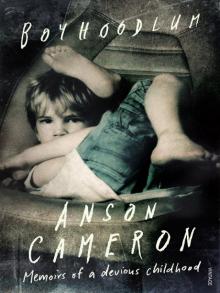 Boyhoodlum
Boyhoodlum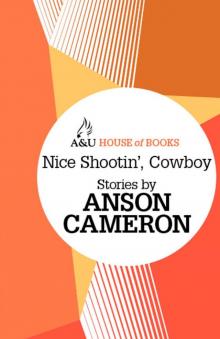 Nice Shootin' Cowboy
Nice Shootin' Cowboy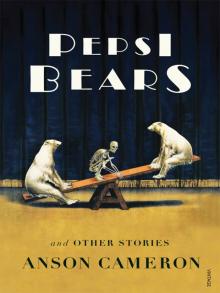 Pepsi Bears and Other Stories
Pepsi Bears and Other Stories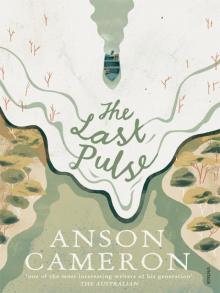 The Last Pulse
The Last Pulse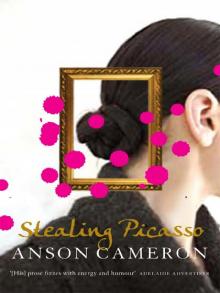 Stealing Picasso
Stealing Picasso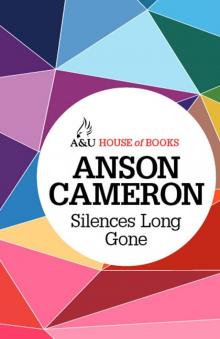 Silences Long Gone
Silences Long Gone